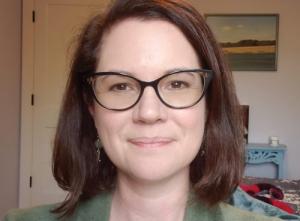Portland General Electric
Kellie Cloud is Senior Director, Engineering Services at Portland General Electric.
PUF readers know we love staff at all our member organizations. PUF digs deep to give insight to how staff got there, what they do, how they do it, and what advice they have. When a utility like Portland General Electric allows access to two rising stars that help make all the wonderful work happen, PUF wants to know more. You want to listen in on these two engaging talks with Kellie Cloud and Quintin Gaddis, who are sure to be around for a long time and sure to go far.

PUF's Steve Mitnick: You have an important job at Portland General Electric. Talk about it.
Kellie Cloud: I'm the Senior Director of Engineering Services at PGE. I have three primary business units reporting up through me.
One of them is the power supply engineering services group. That team primarily supports our generation facilities, designing capital improvements, and supporting maintenance and compliance activities for our generation fleet.
It includes mechanical engineers, electrical engineers, and civil engineers. They're also responsible for dam safety, fish plans, welding certification, land surveying, and technical functions to keep our generation healthy.
The other business unit is grid asset engineering, and that team is primarily responsible for designing capital improvements to our transmission and distribution system, including substations and telecommunications.
The third one is asset management. They use analytics and do planning studies to develop projects, and report on our reliability. We've got geospatial information systems and analytics on that team. There's a group of maintenance engineers and operations engineers focused on supporting operations and monitoring the health of our system on a day-to-day basis.
With asset management, they may be planning capital projects, but they do not do the detailed design work for capital projects. They are focused on operations and planning activities, as well as associated NERC compliance.
PUF: What is a typical day like?
Kellie Cloud: I spend a lot of time in meetings with my peers, homing in on our priorities, what our risks are, and charting a path forward through a large number of challenges. I'm helping remove roadblocks.
My current focus is around resilience. We experienced two unprecedented storms, a wildfire event, and an ice storm in February.
I'm helping coordinate a cross functional team to define resilience for our organization in terms of customer and community outcomes. We're making sure as we plan the grid, as we define our design criteria for our generating facilities, that we understand our community's needs, and our changing environment. We're doing root cause assessments on some of those failures during the ice storm and working on wildfire mitigation.
Eventually we'll look into the Texas energy crisis to make sure specifications for our generation facilities address changing climate. That's a big focus, figuring out how we move forward and engage with our community and prioritize that work in light of everything else we have point on.
PUF: What were you doing during these two events?
Kellie Cloud: During the Labor Day wildfire, I was a part of our incident command structure. I was a deputy incident commander. I had played other roles in our incident management teams in years past, but I've been transitioning to the incident commander role.
For the February storm, I served as incident commander and we took shifts. I typically do day shift and one day I would be fully on duty as the incident commander setting our objectives and approving external communications, and then on the other days I would balance my day job and support the other incident commander.
PUF: How did your background lead to this role?
Kellie Cloud: I was the director of our substation operations prior to this. That was a combined business unit. Half of my employees were engineering, and the other half were field construction and maintenance crews.
At the time, we had a different organizational structure. I oversaw the grid asset engineering part of my current org, as well as substation operations, so it was a combined engineering and operations unit. Prior to that, I was a senior manager over the operational technology functions, focusing on telecommunications, SCADA, and protection.
I grew up in Portland but went to college at Trinity University in Texas. As a liberal arts school, Trinity emphasized teamwork and communications, even in their engineering program, which prepared me for leadership roles. Right out of college, I worked for Brown & Root for a short time in the oil and gas industry. I started out as an instrumentation engineer and that work was super fun.
Designing oil platforms is like a giant puzzle, but that was not what I wanted to do long-term, especially since at the time, most of the work was not domestic and it was difficult for women to have opportunities to work in the field, on site.
I came back to Oregon and stumbled into the electric utility industry. I was hired by a small firm to do an instrumentation job on a hydroelectric facility, but the job was canceled, so they reassigned me to a substation project. I learned on the job how to design substations.
PUF: As leader of broad engineering groups, is it is true that most of the people you were supervising were of one gender as opposed to the other?
Kellie Cloud: Going all the way back to college, it was normal for me to either be the lone woman or one of only a couple of women in my classes. That became the norm for me.
It didn't make me uncomfortable in college, although I did take note of it as I moved into the workforce. I've generally been supported by my male peers. I think back to my first ride-along with a field technician. As soon as I came to PGE, I needed to go out in the field and spend time with the guys doing the work.
There was some resistance to welcoming me. There had been a prior female supervisor of that field team who may not have been ready for the leadership opportunity. I was told clearly that I came in in her wake and I would have to work hard to earn the trust of my field counterparts because there was this idea, at the time, that women were being given opportunities without the proper background and training. I knew I had an uphill climb as far as building trust and proving I was worthy of the opportunity.
I did not know at the time that I was a diversity hire. I learned, probably ten years later that I had very little competition for my first engineering job at PGE, simply because I was a woman, and my hiring was expedited. That was a shock and was somewhat disappointing.
On this first ride-along, the tech looked at me and said, I don't know what you're doing here. I don't have time to entertain you. You can sit over there. I spent the entire day helping him with his job, marking up drawings for him, which is a tedious task.
By the time that technician retired, he was calling me probably twice a week. I was his trusted technical resource. I had a great relationship with the field technicians, but I had to work hard to earn that trust.
Leadership has slightly different challenges and comparing my style of communication to my male peers, occasionally people reacted more strongly to my direct communication styles than they did when my male peers were similarly assertive. It looks different, and it's perceived differently from women.
There have been some challenges, and throughout my career I've focused on delivering value and proving my worth. But as I mentor other women, their experience is different. What they should be expecting, I think is different.
PUF: For younger women, just starting their careers, what do you tell them?
Kellie Cloud: Unfortunately, there's no silver bullet but definitely don't dim your own light just because someone makes you feel bad. Work hard and deliver results to earn trust. Where I've been doing some soul searching is thinking about some of the compromises I made along the way that I would not recommend they make.
Early in my career, I wore a skirt, and a man commented on it. I didn't wear a skirt to work for ten years after that. Today, I would advise a woman in that situation to say something, if not to the man, then to their manager or someone from HR in order to communicate how that made her feel. At the time, I just took it and changed my behavior.
As I work with women who are seeking leadership roles, understanding where we need to be focused on our behavior versus where we can be advocates for ourselves and for our peers, it's different than when I started out. I was advised to behave and act and dress like a man. I don't believe that's necessary today.



